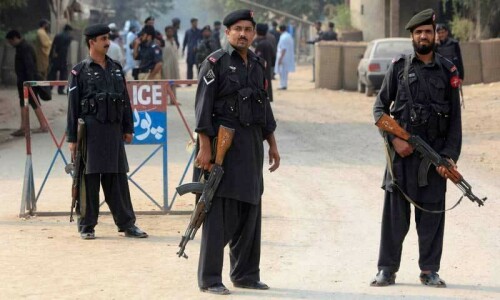PESHAWAR: In Peshawar, more than 50 per cent of women and even many men can’t read their nikahnama (marriage certificate); 74 per cent women aren’t consulted before the filling of marriage registration forms, and 40 per cent married women don’t even know who had filled them, says a recent study done by the Provincial Commission on the Status of Women (PCSW).
The findings of the study on ‘marriage registration in Khyber Pakhtunkhwa’, which targeted around 400 households in 18 selected union councils of Peshawar district, were launched at a local hotel on Wednesday.
Among participants were lawyers, rights activists and journalists.
The survey done to understand the challenges and issues related to marriage registration in the province was the first of its kind and scope in the region.
Suhail Farooq, head of the economics department of Hazara University, who conducted the survey for the PCSW sponsored by the Aurat Foundation and USAID, said it was surprising that clauses relating to women rights were crossed beforehand a marriage took place.
He said usually, family elders filled marriage forms.
“We didn’t come across a single woman during the survey who filled her marriage certificate form for herself,” he said.
According to the survey, 51 per cent of marriages have been found to be unregistered or the respondents had no idea about registration of his or her marriage. Mostly, non-registration of marriage was being attributed to customary practices.
Experts said actually, the clerics, who solemnised marriages, didn’t report marriages as either they didn’t consider it their responsibility or they were ignorant about the importance of their registration.
“There should be ownership of marriage certificate and it should be simplified,” said Muntazir Khan of the home department.
Some participants suggested simplification of marriage registration form and improvement of the capacity building of marriage registrars, while others insisted marriage certificates and rights of a person and its importance should be made part of syllabus for students up to matriculation level.
They also suggested that marriage registration be made part of the National Database Registration Authority record and that there should be a computerised mechanism to keep record of marriage registration.
The PCSW recommended some additional clauses in the marriage certificates.
“The marriage certificate should have some additional clauses indicating if the bridegroom is already married, has never married or a widower… names of bridegroom and bride with detail description of his/her education, profession, property, and monthly income, whether spouse will live under joint family system, separate or otherwise?”
However, Meraj Hamayun, a member of the PSCW and a legislator, said listing dowry items was a clause of the marriage certificate form, which encouraged dowry.
Amina Durrani of the PSCW said the participants’ feedback would be incorporated in the final policy recommendations. She said one of the recommendations was that there should be a penalty for marriage registrar over violation of the law, or misuse of powers.
She said a marriage registrar could be penalised with rigorous imprisonment extendable to three years and a fine of up to Rs50,000 if he didn’t follow the legal registration process.
Published in Dawn, August 7th, 2014














































